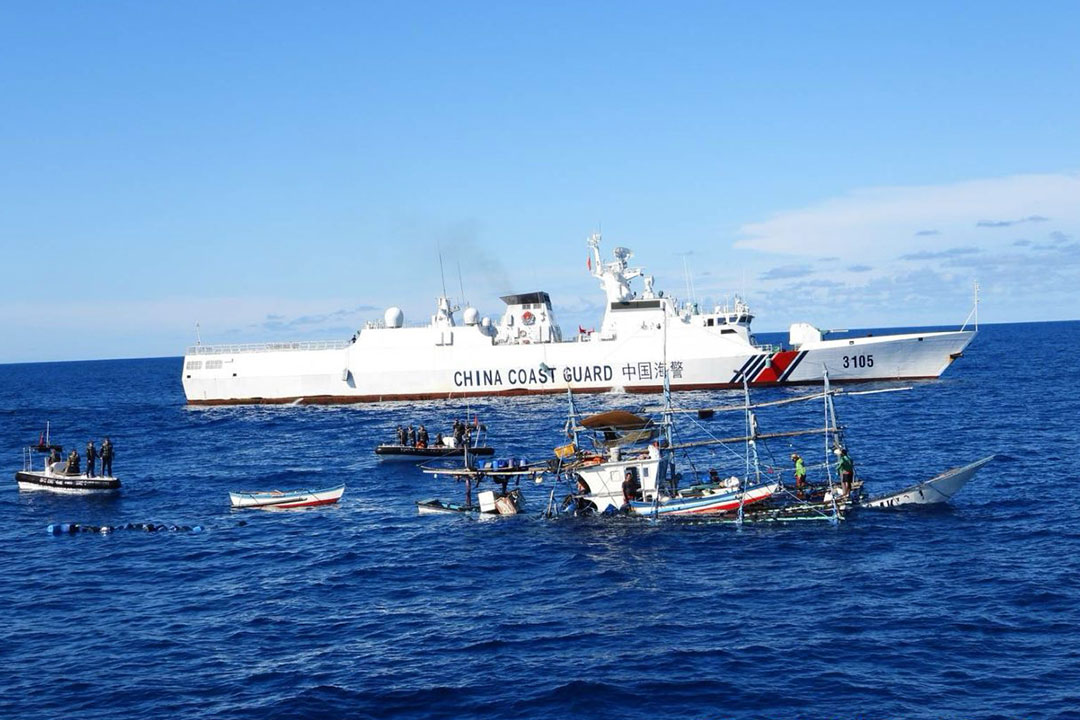
Being Right
By Jemy Gatdula

“Thank heaven for a man who makes up his mind,” says M to James Bond in Moonraker. Which isn’t prosaic at all. A lot hinges on knowing what one wants and in the realm of international policy, this could ultimately mean success or failure.
The same is true in what lies before us in the West Philippine Sea. The Marcos Administration, taking a firmer stand against China’s attempted encroachment of our territories, initiated “assertive transparency” towards the regional bully. It did attain some success, particularly in shedding light over the arrogant international law violations of the latter. But transparency is not a strategy but a tactic. And clearly, it’s not a goal. Of this Lucio Blanco Pitlo III made a cogent observation:
“Reaction to China’s behavior in the South China Sea defies Beijing’s desire to keep the hotspot under wraps. But between weathering reputational costs abroad and placating growing domestic nationalist expectations at home, Beijing [has] made clear who its primary audience is. Besides, China may calculate that international pressure will wax and wane and may peter out. For the Philippines, drawing attention to the flashpoint to gather international support comes at the expense of straining ties with its largest trade partner and the risk of engendering reliance on external support for its security.” (“Deep hazards for China as dispute goes global,” South China Morning Post, July 2, 2024).
This was echoed by RAND senior defense analyst Derek Grossman: “Manila recently adopted a strategy of ‘assertive transparency’ toward Chinese encroachments into its EEZ (exclusive economic zone). Philippine ship crews are now recording each incident of Chinese coercion and publicizing it for the world to see. The idea is that Beijing will no longer be able to deny its actions as it has done in the past — and perhaps be shamed into adhering to international law.” However, “none of these measures have been successful against gray-zone tactics so far, and any future success is likely to take more time as Beijing continues to eat away at Manila’s EEZ.” (“How to respond to China’s tactics in the South China Sea,” June 3, 2024).
Which leads us to asking what is the end we are seeking? What is our purpose in keeping up this struggle against China? For China, the answer has been made quite clear and that is to assert dominance over the entire South China Sea, including that of the West Philippine Sea. But for the Philippines?
Various answers have been proffered, many revolving around variations of reverting to Filipino fishing rights as of 2016 or 2013. But that is neither here nor there. And a bit shortsighted. For the Philippines, in a game that is normally played out in centuries rather than merely a handful of years, complete and utter sovereign control by our country over every island, rock, and waters that it has claimed or claims should be the objective.
Hence, some initial recommendations:
1. Categorically declare China’s action as an “aggression” involving an “armed attack” in violation of international law.
2. In coordination with our security allies, raise the issue of China’s aggression in the West Philippine Sea before the UN General Assembly, as provided for under the “Uniting for Peace General Assembly resolution 377 (V).”
We should ask for a binding security resolution a.) demanding China stop its aggression in the West Philippine Sea, b.) that China abide by the Arbitral ruling, and, c.) demand that, in case China violates a.) and b.), that UN members take all necessary measures to compel China to comply with said resolutions.
3. File cases under the United Nations Convention on the Law of the Sea or UNCLOS for violation of environment provisions. Cases can be also filed under the World Trade Organization (WTO) Agreements for trade related cases, including trade related cases involving damage to the environment.
4. Shun any public announcement regarding upcoming Rotation and Resupply missions. The point is to publicly assert Philippine prerogative over our territory, without need of foreign permit.
5. Any event similar to what happened in Ayungin Shoal on June 17 should be met with proportionate countermeasures, including the summoning and severe reprimand of China’s ambassador, as well as the expulsion of core Chinese diplomatic officials, starting with their defense attache.
6. Legislate an effective government succession plan (see my column, “Presidential succession and the war cabinet,” May 24)
7. “Revise the US-Philippines treaty to reflect modern gray-zone threats. Rather than vaguely highlighting an ‘armed attack’ as the prompt for US military intervention, Manila and Washington could broadly note that gray-zone activities could or would count as armed attacks.” (See Grossman)
8. Order the Department of Justice to be more aggressive in the prosecution of illegal Chinese visitors or legal Chinese visitors engaged in unlawful activities, including activating the national security clauses in the Customs Modernization and Tariff Act, the WTO and ASEAN agreements, bilateral investment agreements, as well as the anti-money laundering law to confiscate, regulate, monitor, or stop investments, financing, or trade from foreign countries that are compromising our national security.
9. Prosecute Filipinos engaged in disseminating foreign propaganda compromising our national security or mitigates national resolve to defend our country, particularly those paid to do so by said foreign countries. This is with emphasis on propogandists in social or traditional media, universities, business associations, including government offices and especially the military. Presently there is Commonwealth Act No. 616, PD 79, and the Revised Penal Code on sedition. There is a need to legislate criminalizing treason during peacetime, as well as updating the said CA 616, to revive the anti-subversion law, and revive, expand, and enforce a national security act.
10. Institute massive investment and tax incentives for industries or businesses that will bolster our self-reliant defense posture, including tax write-offs for donations (in money or in kind) to the military, including donations from local industries of security allies.
11. Revive the Reserve Officers’ Training Corps or ROTC for all college age individuals and institute mandatory military service for all Filipinos aged between 23 and 35 years of age.
12. Legislate de-risking from China of our energy and water industries, including diversification thereof. A national security act should be legislated allowing for the immediate takeover and control of private businesses essential to uphold national security, including energy and fuel, water, media, essential food and other household commodities, and transportation.
We need to be confident that our constitutional system allows us the flexibility to protect ourselves. We should not be shackled by mistaken understandings of the freedoms of speech, liberty, and property so that such freedoms are not used against us by countries that do not respect those rights.
Ultimately, the right to defend ourselves is inherent. We should not constrain ourselves by tentativeness or insecurity in doing whatever needs to be done to protect our people, territory, and sovereignty.
The views expressed here are his own and not necessarily those of the institutions to which he belongs.
Jemy Gatdula is the dean of the Institute of Law of the University of Asia and the Pacific and is a Philippine Judicial Academy lecturer for constitutional philosophy and jurisprudence. He read international law at the University of Cambridge.
https://www.facebook.com/jigatdula/
Twitter @jemygatdula